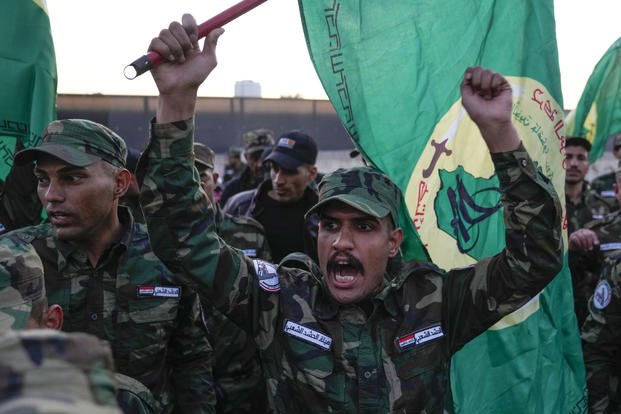The U.S. military conducted an airstrike in Baghdad that killed the leader of an Iranian-backed militia on Thursday in a rare move that comes amid rising tensions and violence in the region, the Pentagon confirmed Thursday.
Maj. Gen. Pat Ryder, the top Pentagon spokesman, told reporters at a briefing that "U.S. forces took necessary and proportionate action against Mushtaq Jawad Kazim al-Jawari," also known as Abu-Taqwa, who the Pentagon says was a leader in the Harakat al-Nujaba group. The Associated Press also identified the same man as Mushtaq Taleb al-Saidi.
The strike in the capital city jarred U.S. relations with Iraq and is the latest military action in the region as conflict has flared following the start of the Israel-Hamas war. Iran-backed militants have launched numerous attacks on bases housing U.S. troops in Iraq and Syria, and Houthis in Yemen have conducted drone and missile attacks on merchant ships in the Red Sea protected by U.S. forces.
Read Next: Denied Care, Deaths in Japan Result from Lack of Emergency Medical Services for American Personnel
Ryder added that "Abu-Taqwa was actively involved in planning and carrying out attacks against American personnel" and that the strike also killed one other Harakat al-Nujaba member.
The Pentagon said that, to date, American forces in Iraq and Syria have endured 120 attacks that have injured 74 service members. All but one have returned to duty. In response, the Pentagon has conducted several airstrikes on various Iranian-backed militia locations in Syria and Iraq.
The latest strike in Baghdad appeared to be the first to target a specific person or militia leader.
Ryder stressed that the strike was a matter of self-defense and that the U.S. maintains "the inherent right of self-defense and will take necessary action to protect our personnel."
The strike again angered the Iraqi government, which called it "a blatant attack and blatant violation of the sovereignty and security of Iraq" in a social media post on Thursday.
"We consider this targeting a dangerous escalation and assault on Iraq, far from the spirit and letter of the mandate and the work for which the international coalition was created in Iraq," Yehia Rasool, a spokesman for the Iraqi military, said in the post.
Meanwhile, the Pentagon, in what is becoming a growing trend concerning its actions in the Middle East, offered few other details or justifications.
Ryder did not have answers when asked about what weapon or platform was used to kill Abu-Taqwa, the level of danger he and his group posed to U.S. forces, or whether the Iraqi government was notified in advance.
"I have provided you the information that I have available to provide, and I have answered why this was a self-defense strike," Ryder said after a reporter asked "why the U.S. can't provide basic information about a strike that it conducted in an allied nation's territory."
The Harakat al-Nujaba group was designated as a terror organization by the State Department in 2019. According to a call readout, Defense Secretary Lloyd Austin told the Iraqi prime minister in December that Harakat al-Nujaba, along with Kataib Hezbollah, "are responsible for most of the attacks against coalition personnel, and that the United States reserves the right to respond decisively against those groups." The breakdown of how many attacks each group was responsible for was not provided in that statement.
There has been a similar silence from military officials about any details involving the Navy's actions shooting down Houthi drones and missiles in the Red Sea.
The head of the Navy's Central Command, Vice Adm. Brad Cooper, told reporters in a briefing Thursday that U.S. ships shot down 65 drones and missiles in the Red Sea while defending merchant shipping over the last several months, but Navy officials have made few other details public.
Military.com has repeatedly asked and been denied answers to the armaments the ships employed in downing the missiles and drones in all but the very first engagement.
On Tuesday, Cooper presented one of the destroyers that took defensive action in the area a combat action ribbon -- a prestigious combat award that the Navy has rarely bestowed on its ships.
Navy officials were unwilling to provide the citation behind the award when requested by Military.com. A request for an explanation was unanswered at the time of publication. Cooper, when asked if the citations will be released, told reporters that "we'll follow up on that."
When Ryder was asked if the award signified that Navy ships are considered in combat while conducting a defensive operation in the Red Sea, he replied that "the admiral's actions speak for themselves in terms of recognizing the crew ... so let's leave it at that."













